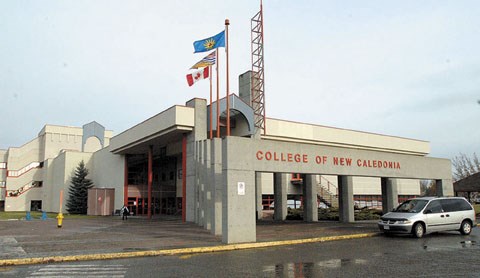College of New Caledonia staff pressed for upgrades to student services as part of the college's budget consultations on Wednesday night.
The public budget consultations were simulcast using a video conferencing link between the college's Prince George, Quesnel, Vanderhoof, Burns Lake, Fort St. John, and Mackenzie campuses. The college has been undertaking internal consultations over the course of January. Wednesday's consultation was open to the public.
Administrators heard from the staff union, instructors in Prince George and staff in Vanderhoof.
Jacob Madjitey, an instructor in finance and commerce, made a presentation advocating for the need to establishing a career centre. This centre would aid students in entering the job world and gaining work experience.
Madjitey said the need for such a service is particularly pronounced for international students, whose numbers have ballooned in recent years. CNC is one of the few public insitutions in the province that does not have such a centre, according to Madjitey. Only the Niccola Valley institute of Technology and Selkirk College lacked a career centre.
"CNC is actually the exception to the rule," he said.
CNC previously had a career centre on campus, but it was scaled back as a result of cost-cutting. Madjitey estimated hiring the staff needed for such a centre would cost the college an additional $175,000 annually, but said the service was particularly in-demand from international students. He said these services are important for international students to succeed in the Canadian job market after graduating.
International student pay more than three times the tuition of domestic students at CNC, and are accounting for an increasing portion of the college's revenue.
According to the most recent headcount by the Ministry of Advanced Education, Skills and Training, the international student population grew by 78 per cent between 2015-2016 and 2016-2017, and now account for 11 per cent of the total student headcount for CNC.
Lily Bachand, president of the staff union CUPE Local 4951, raised several questions about the adequacy of support services offered to international students. She noted that many international students find their preferred courses are unavailable or full. Domestic students are given first pick for most course offerings. She also said better ESL programming and increased tutoring services are necessary for these students to succeed.
"What are we doing to support them? They come in here, they have a language issue. I know there is a testing, but is the testing adequate?" said Bachand.
International students are required to have a score of 80 on the Test of English as a Foreign Language (TOEFL), as well as a score of 6.0 on the International English Language Testing System (IELTS). Both are international standardized tests for academic English. The college also offers a preparatory ESL program.
But international students learning in a new cultural and academic environment face many challenges. Bachand said faculty and staff are often faced with increasing requests for help from international students. She said additional support should be given to international students in the form of tutoring.
"If we're running programs with this amount of international students coming in, make sure our faculty are hired in advance, make sure they are prepared for their classes. Then evaluate the students when they come in and say 'what do they need?'" she said.
Bachand also urged the college to provide base funding for its applied research department. CNC's applied research department, which partners industry with researchers on campus, currently operates on a cost recovery basis.
She also drew attention to the organizational culture of CNC, which her presentation described as being overly secretive and reactive. The college has made a number of institutional changes in the last few years in terms of the relationship between the central campus in Prince George, and the community campuses in Vanderhoof, Mackenzie, Fort St. Jean, Burns Lake and Quesnel. Academic deans based in Prince George are responsible for faculty on these regional campuses.
Bachand said she was concerned that staff in regional campuses feel they are not adequately included in decisions made in Prince George.
"We're going through such a structural change in so many areas that we have to stop and look at it. We're putting the cart before the horse. We need to look at it and say what needs to happen and go from there," she said.



